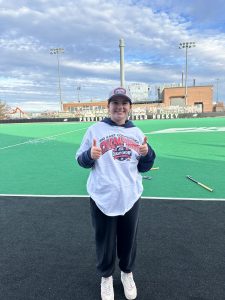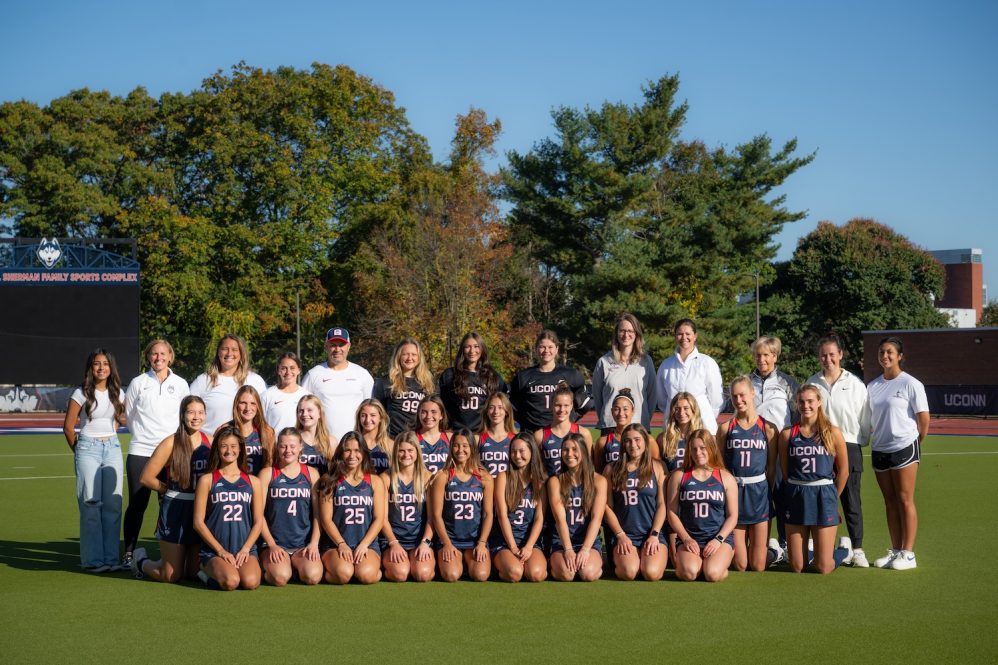Six years ago, UConn Field Hockey head coach Paul Caddy reached out to the head of the Department of Statistics in the College of Liberal Arts and Sciences. He wanted to find an informal way for students learning statistical methods to work with his team, integrating data analytics to gain a competitive edge.
After a pandemic and various other obstacles, the collaboration never came to fruition.
Then, in Fall 2023, Alyssa O’Keefe, an academic advisor in the Department of Statistics and Applied Data Analysis, launched a formalized sports analytics internship program and Caddy saw a new opportunity to bring that vision to life.
For the past two years, the Sports Statistics Experiential Learning Program has provided UConn Athletics with statistical information to improve their performance while allowing students the opportunity to gain practical hands-on experience to prepare them for careers in data.
O’Keefe says she got the idea for the program after the parent of an incoming student asked if it would be okay for her to leverage her connection with a coach to get her son experience with a team. O’Keefe says she saw an opportunity to expand that access to other students who may not have those personal connections.
“I’ve had so many students sit across my desk telling me that their dream job would be sports analytics,” O’Keefe says. “We have 18 teams. How could we not have a way to make this connection for them?”
In the Fall 2024, the program paired Caddy with Julia Mazzola ’25 (CLAS), a statistical data science and economics double major, who analyzed attacking penalty corners, a crucial scoring opportunity that happens when a foul is made in the area around the goal. The data provided real-time insights that Caddy says he’ll use as part of his coaching throughout the seasons.
“In the couple of seasons leading up to this one, our performance has not been what it needs to be offensively or defensively on corners,” Caddy says. “So, we need to get some data to see what works and what doesn’t.”

Having previously met Joe Ferriss, former director of Men’s Hockey Operations, O’Keefe reached out with her idea of partnering statistics students with athletic teams. Ferriss was impressed with the concept and became the first to agree to join the program.
As word spread around the Athletics teams of O’Keefe’s initiative, more teams began to show interest. The program began with just three teams— baseball, men’s hockey and football—but has since expanded to 11 teams including the women’s basketball team which won the 2025 NCAA Division I Women’s Basketball Championship.
The internship program will be adding the Department of Sports Performance to its list of participating athletics programs in the fall and O’Keefe says she hopes more teams will sign on.
Unlike traditional coursework, this internship places students in dynamic sports environments where they work on various analytical projects tailored to the needs of the teams they’re paired with. Projects include tracking player positioning and movement through game footage, assessing player performance during various points of the game to refine strategy, providing statistical insights during competitions, and analyzing recruitment data.
Many interns work directly with coaching staff, integrating data into team meetings and game planning, O’Keefe says.
Students can earn credits for the internship and can intern for a semester or a full year. The time commitment varies from one placement to another, and O’Keefe says students selected for the program must agree to the conditions before they begin.
Mazzola interned with Caddy’s team for one semester, and Caddy says she felt like a member of the team.
“It is a unique experience,” Caddy says. “She’s on the sidelines during games. She’s going to get a championship ring because we won the Big East Championship. We think she’s part of the field hockey family.”
He says he hopes to continue working with student interns and that Mazzola’s project is something the team “can lean on a little bit, moving through the seasons.”
For Mazzola, the program is a career stepping stone. She plans to start her career in underwriting at the Cigna Group after she graduates in May and credits the internship with reinforcing her passion for analytics and problem-solving.
“One thing about underwriting is there’s a lot of moving pieces, and there’s a lot to learn,” she says. “You have to take in many aspects when you make a decision, and the field hockey internship was very helpful in learning how to piece things together, like solving a puzzle.”



